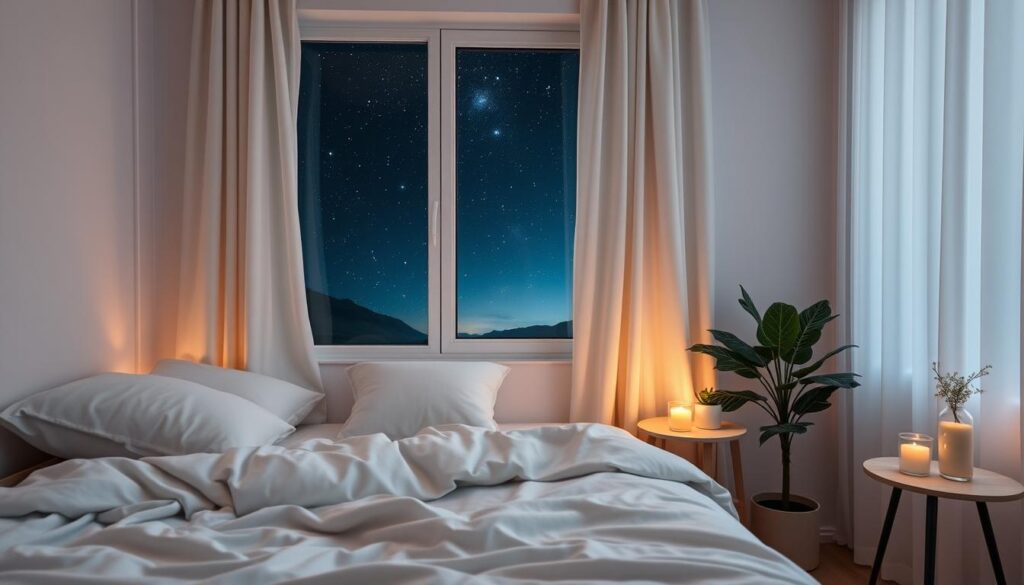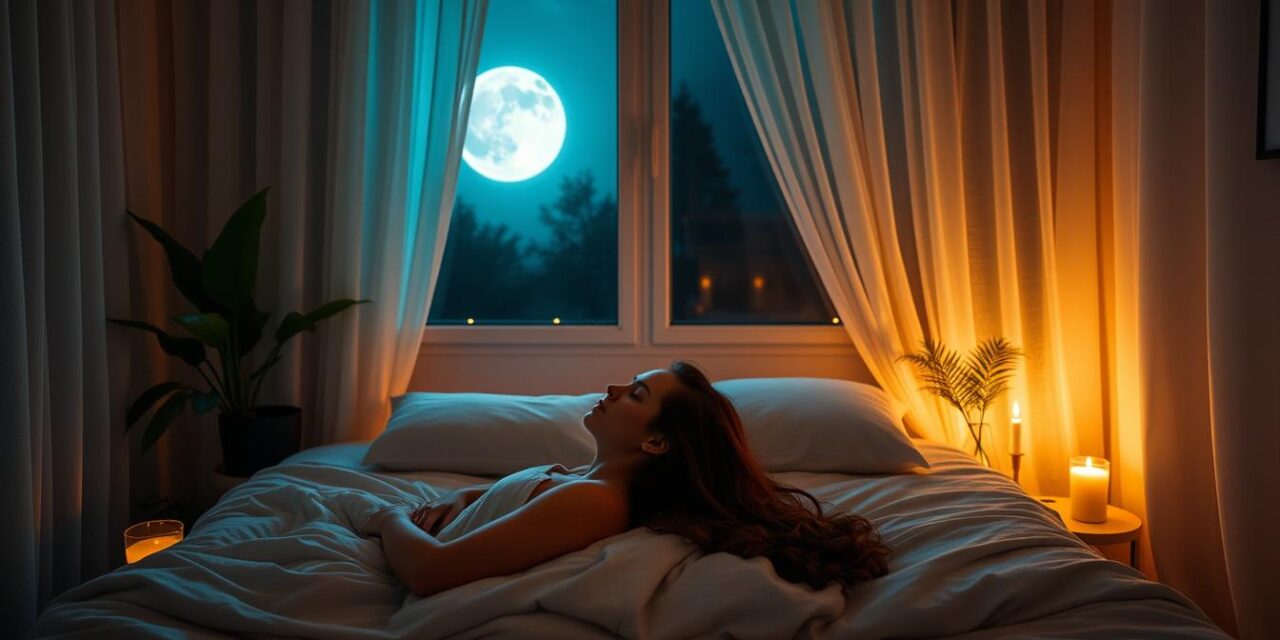Did you know almost 70% of Australians struggle with insomnia? They often lie awake for hours before falling asleep. The good news is, easy meditation for sleep can help. It guides your mind and body to relax, letting go of stress and embracing the night’s calm.
Meditation for sleep is like daytime meditation: gentle and relaxed. Letting your body and mind relax softly is key. Don’t try to force sleep, as it can lead to more thoughts and tension. Just follow the guidance, without overthinking the technique.
Before starting your sleep meditation, lie flat on your bed and breathe deeply. Close your eyes and let your body unwind. If using a guided meditation for sleep, follow the instructions. If doing unguided meditation, go at your own pace. The more you practice, the quieter and more restful your mind will become.
Key Takeaways
- Approach easy meditation for sleep with a gentle, relaxed focus.
- Allow the body to relax and the mind to drift off naturally, without forcing sleep.
- Try guided meditation for sleep or practice unguided meditation at your own pace.
- Regular practice of meditation for better sleep can help build a quiet and restful mind.
- Experiment with various sleep meditation techniques to find what works best for you.
Guided Sleep Meditation: The Path to Restful Slumber
Getting a good night’s sleep can be tough. But guided sleep meditations offer a gentle way to relax. They use different techniques to help your mind and body relax, making it easier to sleep well.
Breathing Techniques
Breathing is key in guided sleep meditations. By focusing on your breath, you tell your body it’s time to relax. Slow, deep breathing can calm your mind and get you ready for sleep.
Body Scanning
Mindful body scanning is another technique used. It involves focusing on each part of your body, noticing any tension. This helps release stress and relax you fully.
Visualizations and Gratitude
Guided sleep meditations also use visualizations. You imagine a peaceful scene, which can calm you deeply. Some also focus on gratitude, helping you feel positive before sleep.
These techniques, like breathing, body scanning, and visualizations, help you sleep better. Adding them to your bedtime routine can improve your sleep and overall health.
“Meditation is not about becoming a different person, a new person, or even a better person. It’s about training in awareness and learning to be present.” – Jon Kabat-Zinn
Setting the Stage for a Peaceful Sleep Environment
Creating a sleep-friendly bedroom is key to getting good sleep. Experts say the best sleep temperature is about 65°F (18.3°C). This cooler air helps your body get ready for sleep. Also, dimming lights before bed tells your brain it’s time to relax.
Getting your sleep space ready is part of your bedtime routine. This might include a warm bath or shower, followed by deep breathing or reading a calm book. Making sure your bed is inviting can also help you sleep better.
- Maintain a comfortable temperature in your bedroom, around 65°F (18.3°C)
- Dim the lights in your bedroom as part of your bedtime routine
- Incorporate relaxing activities, such as breathing exercises or reading, before bed
- Ensure your bed is ready and inviting for a comfortable night’s sleep
Preparing a sleep-friendly environment tells your body and mind it’s time to relax. Creating a peaceful sleep space can greatly improve your sleep quality and overall health.

“The quality of your sleep has a huge impact on your daily life. Creating a peaceful sleep environment is essential for achieving the restorative rest your body needs.”
Good sleep is crucial for your health and well-being. By focusing on your sleep environment, you’re taking a big step towards better sleep and feeling refreshed.
The Benefits of easy meditation for sleep
Adding easy meditation to your bedtime routine can greatly improve your sleep. Studies show that meditation helps reduce stress and anxiety. These are big reasons for insomnia and restless nights.
Reduced Stress and Anxiety
Meditation has been studied for decades in Western medicine. It can help you relax and ease stress. Techniques like deep breathing and body scanning in guided meditations activate your body’s rest mode.
This can greatly lower stress and anxiety, making it easier to sleep well.
Improved Sleep Quality
Meditation also boosts sleep quality. A 2018 study found that mindfulness meditation improved sleep. The benefits lasted for months after starting.
Meditation trains your mind to stay present. This helps you react less to stressors that can keep you awake.
Using meditation before bed can greatly enhance your sleep and well-being. Try guided visualizations, body scans, or simple breathing exercises. The sleep benefits of meditation are clear and worth trying.
Bedtime Routines: Incorporating Meditation for Optimal Results
Creating a bedtime routine with meditation can greatly improve sleep. Start with personal hygiene and light reading. Then, move to a guided sleep meditation or mindfulness practice. This signals to your body and mind it’s time to relax.
Studies from 2020 show delta wave music can help with deep sleep. Delta wave binaural beats are used in deep sleep meditations. They help the brain match the waves of deep sleep. Meditations can last from 20 minutes to an hour, depending on how fast you fall asleep.
Guided sleep meditation uses deep breathing and body scanning. It helps you relax and get ready for sleep. Experts say meditation before bed connects you to the present, fights negative thoughts, and accesses the rest and recovery system.
For better sleep, have a regular bedtime, avoid screens, and get up if you can’t sleep. A good sleep environment, healthy diet, less caffeine, regular exercise, and a healthy lifestyle also help. These all contribute to improving sleep with meditation.

| Popular Sleep Meditation Resources | Key Features |
|---|---|
| Jason Stephenson | Soothing voice, delta wave music, visualization exercises |
| The Honest Guys | Gentle guidance, body scans, nature soundscapes |
| Calm | Wide selection of meditations, sleep stories, music |
| Headspace | Structured programs, breathing techniques, sleep casts |
By adding meditation to your bedtime routine, you can see better sleep, less stress, and better overall health. Being consistent is important. Make meditation a regular part of your evening routine for the best results.
Popular Sleep Meditation Apps and Resources
The digital world is full of sleep meditation tools. You can find apps like Calm and Headspace, YouTube channels, and podcasts. There are many ways to find guided sleep meditations.
The Calm app has over 70 million downloads worldwide. It offers a huge library of sleep content. You can choose from monthly plans to a lifetime membership for $399.99.
Headspace is another top app for meditation. It has guided meditations for sleep, stress, and mindfulness. With over 70 million downloads, it’s affordable at $12.99 a month or $69.99 a year.
Insight Timer is great for free meditations. It has over 150,000 free meditations, including sleep practices. For $59.99 a year, you get more features.
YouTube channels like The Honest Guys and the Get Sleepy podcast offer unique sleep meditations. You can find everything from body scans to visualizations like “Floating Among The Stars.” Trying different resources can help you find what works best for you.
There are many quality sleep meditation tools out there. Whether you prefer a paid app or a free resource, finding what you need is easy. The journey to better sleep is just a click away.
Overcoming Obstacles: Dealing with a Busy Mind
Managing a restless, busy mind is a big challenge in using meditation for sleep. Instead of trying to push thoughts away, focus on letting go of them. By staying in the present, you can let go of daily worries and stresses. This prepares your body and mind for sleep.
Letting Go of Thoughts
When your mind races with thoughts, gently shift your focus to your breath. Counting your breaths or body scanning keeps you in the moment. This way, thoughts can pass without getting stuck on them. Regular practice helps quiet your mind, making it easier to sleep well.
Anchoring in the Present Moment
Mindfulness is great for staying present during sleep meditation. Paying attention to your body’s sensations or your breathing helps you stay in the now. This awareness lowers anxiety and leads to deeper sleep.
Remember, it takes time to overcome a busy mind. But with patience and effort, you can learn to let go and stay present. These skills are crucial for getting the most out of meditation for sleep.
Jason Stephenson’s “Floating Among The Stars”: A Deep Dive
Jason Stephenson’s “Floating Among The Stars” is a top sleep meditation with over 14 million YouTube views. It’s an hour-long journey to a peaceful night sky. Listeners find it easy to relax and fall asleep in 20-35 minutes.
The meditation uses soothing music and Stephenson’s voice. It helps the mind relax and sleep better. The script has 35 paragraphs, focusing on breathing and body relaxation.
- The meditation has 14 paragraphs on breathing techniques.
- It includes 4 paragraphs on relaxing body parts.
- Relaxation methods are emphasized 16 times.
- Breathing instructions are given 26 times.
While it may not suit everyone, “Floating Among The Stars” is great for deep sleep. It’s a deep sleep meditation that helps you sleep well.
“I’ve been using Jason Stephenson’s ‘Floating Among The Stars’ meditation for months, and it’s become an essential part of my bedtime routine. The imagery and Stephenson’s voice work like magic to quiet my mind and lull me into a peaceful sleep.”
Tips for Beginners: Maximizing the Benefits of Sleep Meditation
Starting with meditation for sleep? Here are some tips to help you get the most out of it. Begin with short, easy meditations to get used to the practice. Then, move on to longer ones. Try different types, like focusing on your breath, scanning your body, or imagining a peaceful place, to see what works for you.
Be patient and keep up with your sleep meditation routine. The benefits will grow over time. Make your sleep area calm and cozy. Also, have a soothing bedtime routine to help your meditation. Remember, just relaxing is good for sleep, even if you don’t fall asleep right away.
- Start with short, simple sleep meditations to get comfortable with the practice.
- Try out different techniques, like focusing on your breath, scanning your body, or imagining a peaceful place, to find what works best for you.
- Stay patient and consistent, as the benefits of sleep meditation often grow over time.
- Set up a relaxing bedtime routine and a cozy sleep area to support your practice.
- Don’t worry if you don’t fall asleep right away – the relaxation itself is good for sleep.
“Meditation is not about getting anywhere, it’s about being where you are and knowing it.” – Jon Kabat-Zinn
By following these tips, you can get the most from sleep meditation. This will help improve your sleep and overall well-being. The key is to make it a regular part of your bedtime routine. Be patient as you build this valuable habit.
Conclusion: Embracing the Journey to Restful Sleep
Meditation can be a great way to get better sleep. It helps relax your body and calm your mind. Techniques like breath work and body scanning can reduce stress and anxiety that keeps you awake.
It might take some time to find what works best for you. But the benefits are worth it. You can sleep better, feel less stressed, and be overall healthier.
Research shows meditation can make your sleep better. Yoga Nidra, a guided meditation, can help you sleep deeper. It also lowers stress hormones, making it easier to fall asleep.
Being consistent with meditation is important. Adding Yoga Nidra and guided visualizations to your bedtime routine can improve your sleep and spiritual health. Let meditation bring you peace and help you wake up feeling refreshed.





